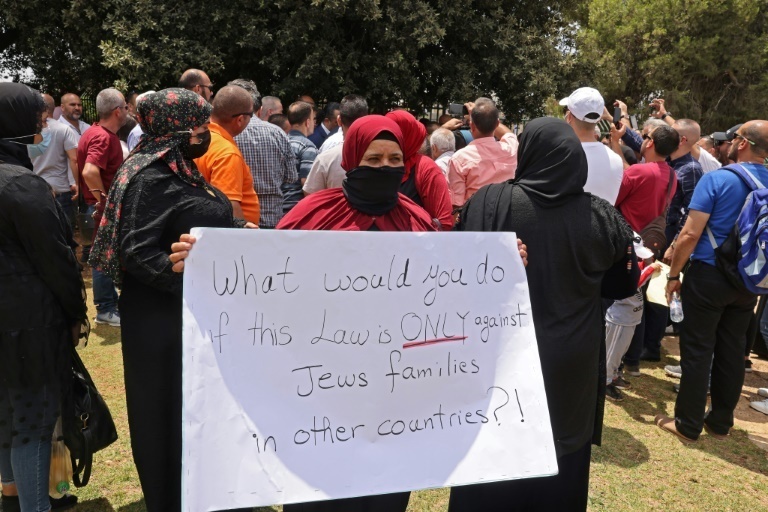Getting your Trinity Audio player ready...
On a practical level, Israel's security is not threatened by the government failure early Tuesday to extend the Citizenship Law barring permanent status for Palestinians married to Israelis.
The failure of the vote is merely a symbolic act that will lead to further bickering between the opposition and the coalition over who is more hawkish and more patriotic.
3 View gallery


Prime Minister Naftali Bennett is flanked by members of his government in the Knesset plenum ahead of the vote on Monday night
(Photo: Knesset Channel)
It will not actually lead to Israel being flooded with requests by Palestinians married to Israelis.
Instead it will primarily lead to an increase in family reunification requests filed with the Interior Ministry and the Shin Bet security service, with a similar rise in petitions to the High Court of Justice from those who will be refused.
Knesset has extended the law 17 times since 2003, when it was first introduced at the height of the Second Intifada and multiple attacks had been perpetrated by Palestinians with Israeli citizenship through marriage.
The temporary law is considered problematic mainly due to the violation of the right of the married couple to maintain a regular family unit, as defined in the Basic Law: Human Dignity and Liberty, which recognizes the right of every Israeli to establish a family as a fundamental right.
The High Court of Justice itself had to uphold the law in two separate hearings, both times passing by a single vote.
3 View gallery


Israeli Arabs protest outside Knesset on Monday ahead of a vote on renewing the Citizenship Law
(Photo: AFP)
The law's declared purpose is based in security concerns that many Palestinians arriving in Israel would take advantage of the freedom of movement granted to them in order to carry out terrorist attacks. But the main, undeclared reason is demographics.
In essence, legislators feared that Palestinians would take advantage of marriage to Israeli Arabs to threaten the Jewish majority in the country. This created the situation in which the law completely prevented family reunification and eliminated the need to individually examine each couple who applied for official status in Israel.
Now, without the law's renewal, Interior Minister Ayelet Shaked will become the official address for all these requests.
The ministry will not have to look into every single request itself. Instead, Shaked will need the Shin Bet to prove that a person poses a security threat to the state.
The security service can simply recommend that a request be denied without providing proper evidence to prove this claim.
However both the Shin Bet and the Interior Ministry are still subject to High Court rulings. If an applicant is rejected, he or she can petition the High Court and force Shaked to justify the denial.
Though it may seem like the law's failure to pass opens up the floodgates for Palestinians to live in Israel, in reality, the situation changes less drastically.
Shaked, the Shin Bet and their clerks will have a hard time until the bill could be reintroduced to Knesset.


